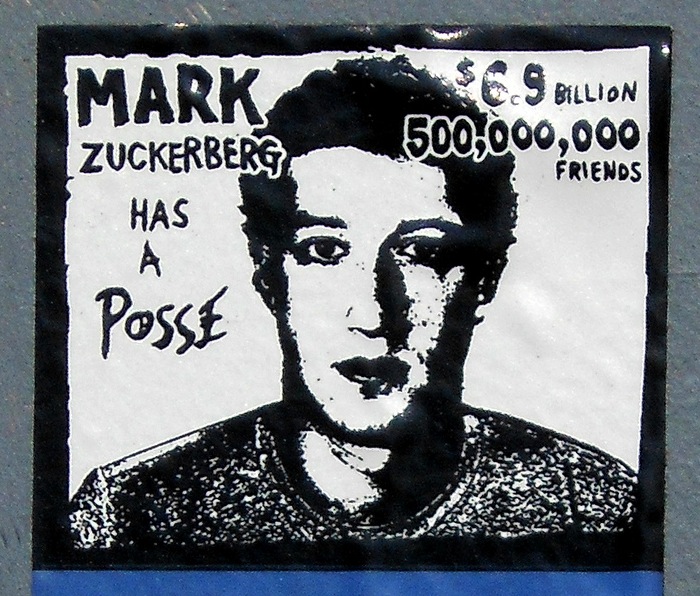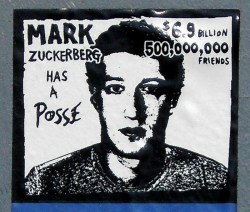First Google turned links into money. Now Facebook is turning likes into money.
To flesh that out: A decade ago, Google found a way to profit from the preferences each of us expressed as we coded links on every home page and blog post we published. Today, Facebook is aiming to profit from the preferences each of us express as we click “like” buttons and peruse the activity streams that Facebook assembles from that activity.
Last week, a front-page New York Times story sounded an alarm about a phenomenon Facebook veterans have known for some time: Facebook now transmutes personal messages into advertisements, and lets companies and individuals pay to highlight their posts on personal pages. Procter & Gamble can pay to tell us about its toothpaste; you and I can tell each other about our lives and loves. And each message has a price tag.
In the wake of Facebook’s controversial public stock offering, the world is finally waking up to the fact that Mark Zuckerberg’s connection machine is a company like any other — one that must now deliver growth and profits each quarter to a restless market, or see the momentum it has built online and the talent it has gathered on its team both drift away.
So what’s wrong with that? Hasn’t Facebook brought us closer to our friends and made the benefits of online community available to a near-universal public? Isn’t it the most effective tool ever created for organizing crowds of people to change the world? Why shouldn’t the folks who brought us the like button reap a giant reward?
The problem is not that a bunch of entrepreneurial Facebook people — most of them imposingly smart and arrestingly young — have made fortunes. The technology industry has seen that happen before, and it will keep happening.
What’s worrisome, rather, is the particular dynamic Facebook will have to exploit in order to deliver results to its investors. Facebook’s value is built on the authenticity of our collective presence on its platform. Now that its financial worth will be measured in daily stock-price fluctuations rather than abstract speculations, the company has no choice but to cash in on that value — to sell us to one another.
“You are the ad,” as a Technology Review headline put it last year.
The Facebook debate is typically framed as an argument over “privacy” and data ownership. Those issues matter, but they also tend to be understood as abstractions — wonky and weedy terrain that only specialists dare traverse. Rather, I’d suggest that we imagine Facebook’s challenge in different terms, not as the next big institution that’s invading our individual personal spaces, but rather as the next media platform that’s monetizing our collective personal space.
In thinking about this, it’s not worth arguing about the specifics of Facebook’s latest tweaking of its news-feed algorithm, or this week’s innovation in the delivery of sponsored posts. The details will keep evolving, and Facebook’s restless development process means that it will back off from the most aggressively obnoxious practices even as it fine-tunes the most effective ones. That’s part of the company’s genius, and something everyone else in the digital world can learn from.
Instead, let’s take a higher-altitude look at where Facebook fits in the lengthy history of the engagement between commerce and popular culture. Useful here is media scholar Jeff Pooley’s notion of “the authenticity bind” [PDF]: the “self-feeding” process by which our ways of relating to one another cycle back and forth between the “calculated authenticity” of the marketplace and “rejectionist forms of authenticity… untainted by the professional smile and the glad hand.” As Pooley explains, we regularly set out on these “flights to deeper kinds of authenticity,” only to find that they are “marketed in turn — returned, that is, to the promotional fold.”
In other words: Facebook builds a platform of hundreds of millions of participants on the promise that it is offering us a “real” way to connect. Then it packages and sells the reality we’ve projected onto it. Sooner or later, this will sour us on Facebook’s version of authenticity, and we will light out for other territories.
What, then, is the most useful way to think about Facebook today? Last year, Harvard’s Jeffrey Rayport suggested that Facebook is now “a vast, branded utility — like another World Wide Web, but with a profit motive.” The utility comparison is apt, to a point. Imagine a world in which your local power company tracked details of your home’s every electricity use and used that data to sell you things. (“Scott, we noticed that you haven’t yet invested in a vacuum cleaner. Throw away that broom!”) That’s depressing enough.
But calling Facebook a utility downplays its position at the fulcrum of our private and public lives, our emotional and professional identities. Utilities are, well, utilitarian; Facebook is transformational. It’s less like a power company and more like a local community hall — one that becomes a megachurch overnight, makes its founders rich, changes the lives of many of its congregants, and then gets mired in money scandals.
If this religious analogy sounds forced, consider the other social-media story that made the Times front page last week: a report on the adoption of Twitter by Christian pastors — “Evangelical Christian leaders whose inspirational messages of God’s love perform about 30 times as well as Twitter messages from pop culture powerhouses like Lady Gaga.”
Forget how you feel about evangelicals for a moment and just think about the trust that all parties to these messages — deliverer and recipient alike — are investing in the social medium. That trust has value, with good reason. But cashing in on that value — which is exactly where the entire social-media universe is headed — can be treacherous for all concerned. That’s when Pooley’s authenticity bind will kick in with another turn of the wheel. We’ll reject the commercial social media’s debasement of personal authenticity and find something that’s at least provisionally better.
There’s little we can do right now to escape this dynamic, whatever our own individual priorities may be, and whatever causes we variously embrace. As we try to make smarter long-term decisions about our lives and our world, this is the landscape we must navigate. Facebook — like America Online and Microsoft and other technology behemoths that have passed their peak — is going to be around for a long time. We can’t ignore it. We’ll need to use it. But we should do so with care and open eyes. And we can keep looking for the better alternatives we know we’re going to need. I’ll try to write about some of these alternatives in coming weeks.





